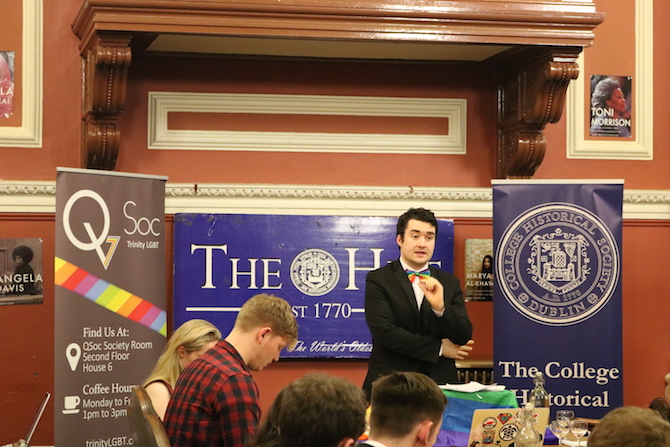TCDSU, Q Soc and The Hist joined ranks yesterday to debate the motion This House Regrets Allies at Pride, the third evening event of Rainbow Week. The motion was proposed by Lorna Staines, Samuel Riggs, Olly Donnelly and Peter Gowan, with the opposition being from Wills Worall, Sinead Harrington, Meg Bare and Caitriona Ni Bhriain. The chair of the debate was Max Krzyzanowski, LGBT Noise activist and spokesperson of eight years.
Each speech was passionate, informative and emotional. There was not a single speaker that didn’t emit a sense of pride whilst talking in front of a room full of people about such a personal topic. From jokes about needing flamboyant gays in the room, to rainbow coloured bow ties and personal references, the evening was not only enjoyable and entertaining, but also highly educational and thought-provoking.
The proposition introduced the history of Pride, which started with the Stonewall Riots in New York on June 27th 1969 . Pride parades started as a form of protest ,and considering that members of the community still experience such a constant struggle, a fight for equality must persist. They addressed the notion that in having allies at pride, it blurs the initial purpose of pride as well as also fostering the idea that members of the LGBT community require validation for their identity. It This creates a culture where people question one another’s sexuality, and Pride is not the primary place for the translation that is often needed in day to day lives. It was also made very clear that an ally isn’t just someone who tags along for the craic, convincing themselves that they’re being supportive.
One very strong proposing point was that of the commercialisation of Pride and how it can have a negative effect by stripping away the meaning of Pride and what it stands for. It was also noted that some of the corporations that sponsor Pride have funded anti-LGBT ideals in the past.
On the other side of it, the opposition presented up a strong argument based on the idea that that allies at Pride are a fundamental source of support for the LGBT community, offering a sense of hope in different types of communities. It was expressed that putting barriers between the queer and the straight community is not a way to move forward. Accepting allies at pride offers a space to those who may not be comfortable with telling anybody their sexual identity or gender orientation without the fear of being questioned as why they are there. It can also encourage parents to attend with their children. It was argued that Pride should be about acceptance and not exclusion: “Act like everybody is Schrodinger’s Queer until the box is opened”.
A very strong opposing point was made that in order for everyone to be comfortable at Pride, allies are needed in the form of every identity in the LGBTQ+ umbrella; in particular, cis members of the queer community can act as allies to trans people within LGBT community. These allies are important to ensure the safety of everyone in the community.
The motion was ultimately defeated, but there was far more to the debate than just one side winning or losing. Both sides made the point that allies are needed, but are needed to be so much more than passive friends showing face; they need to be more than just the very bare minimum of a person behaving decently around and mostly accepting LGBT people. They must continue in the fight for greater equality and visibility, for security and acceptance. All in all, the debate was wonderful, people were welcoming and friendly, everybody was supportive and there was something moving about the feet stamping and clapping when any of the speakers made a particularly powerful point.







